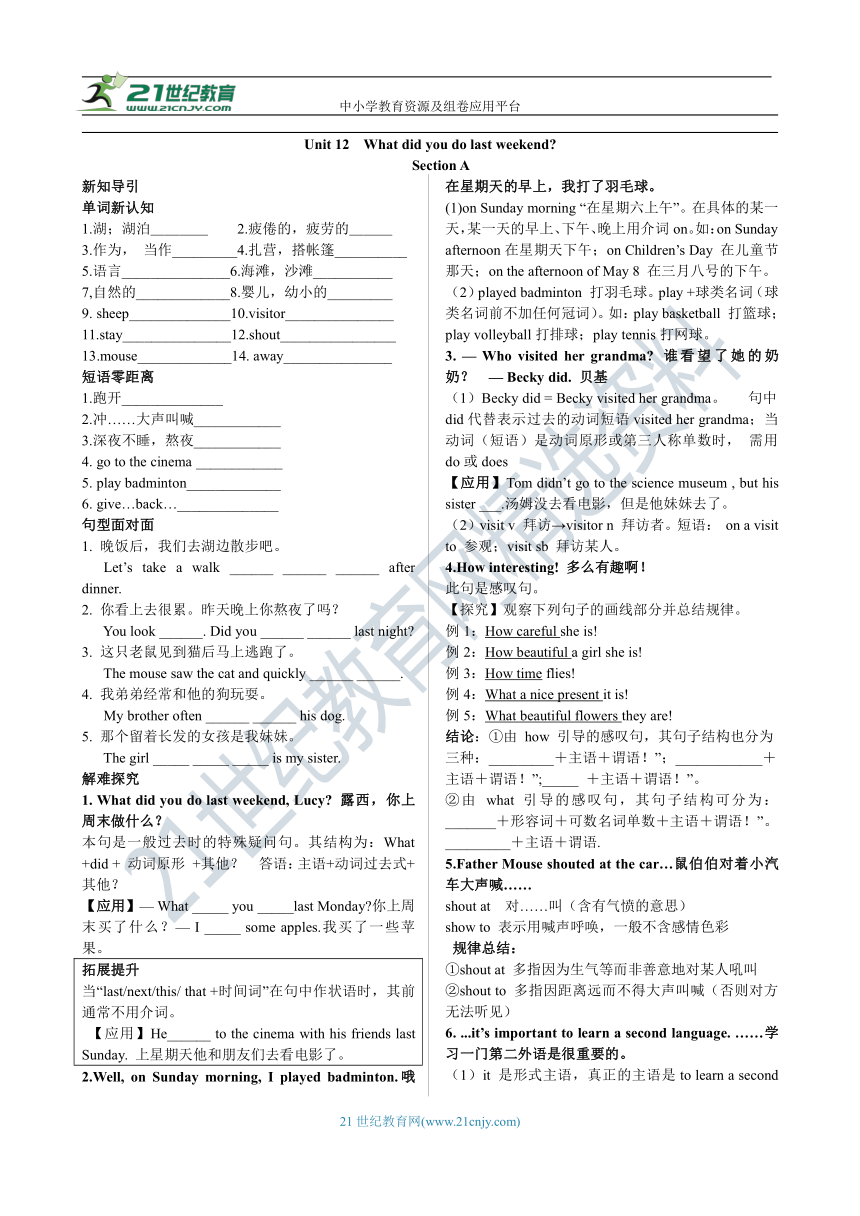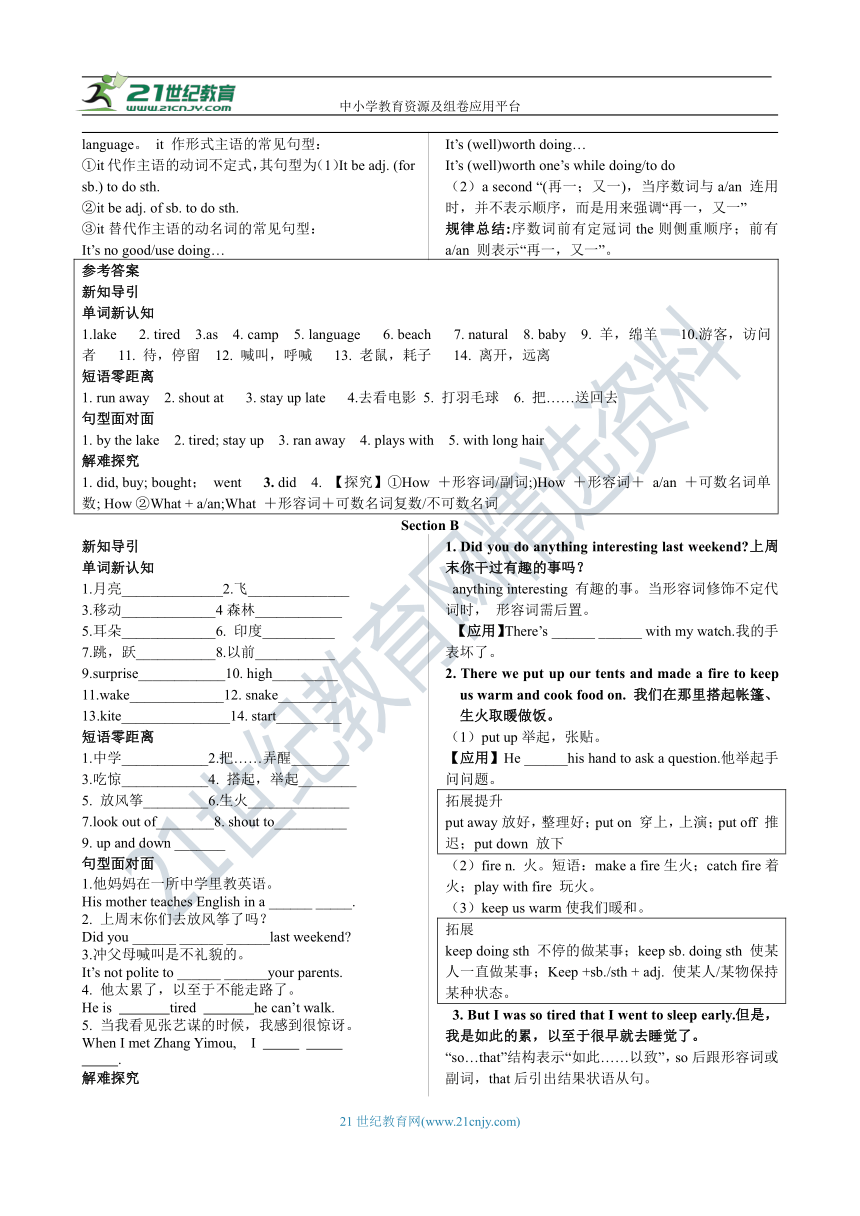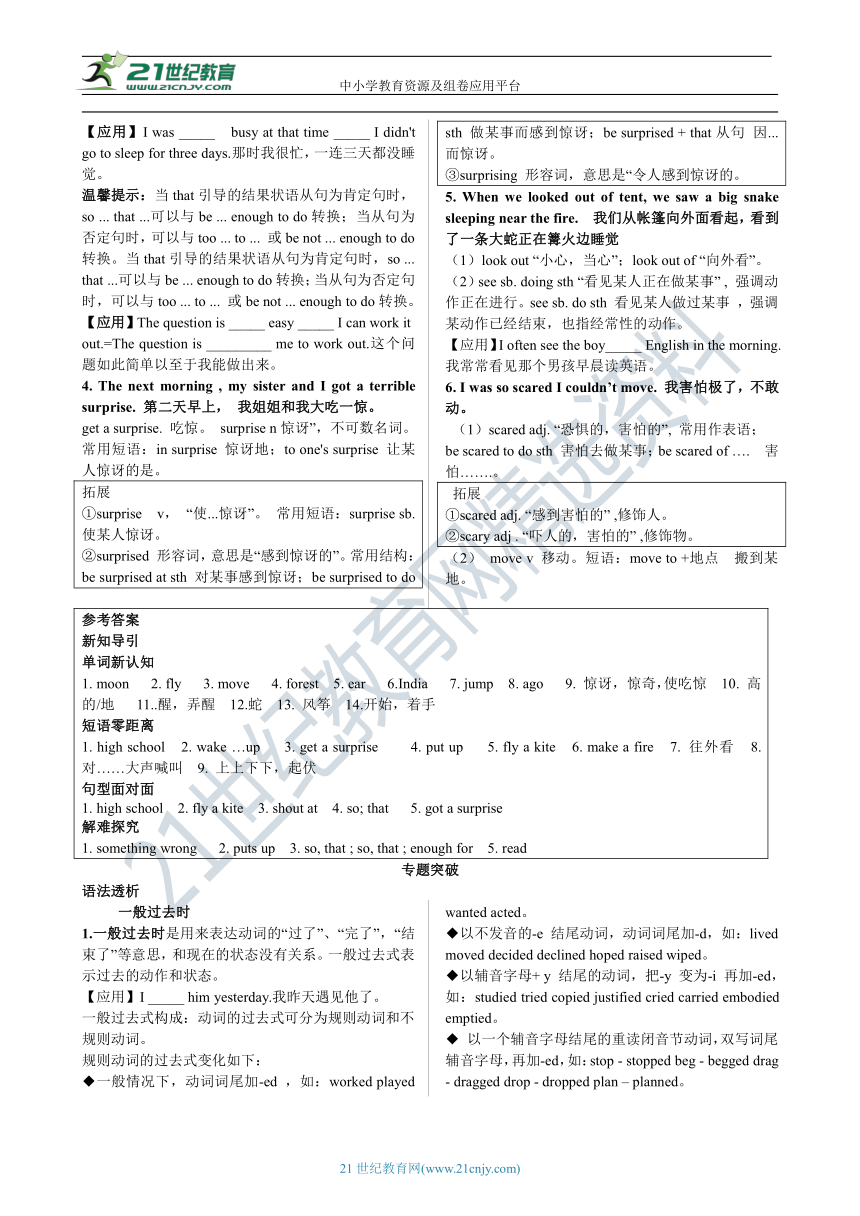Unit 12 What did you do last weekend? 全单元同步学案(含答案)
文档属性
| 名称 | Unit 12 What did you do last weekend? 全单元同步学案(含答案) |

|
|
| 格式 | zip | ||
| 文件大小 | 1.2MB | ||
| 资源类型 | 试卷 | ||
| 版本资源 | 人教新目标(Go for it)版 | ||
| 科目 | 英语 | ||
| 更新时间 | 2019-06-14 00:00:00 | ||
图片预览



文档简介
中小学教育资源及组卷应用平台
Unit 12 What did you do last weekend?
Section A
新知导引
单词新认知
1.湖;湖泊____ 2.疲倦的,疲劳的___
3.作为, 当作_________4.扎营,搭帐篷__________
5.语言_______________6.海滩,沙滩___________
7,自然的_____________8.婴儿,幼小的_________
9. sheep______________10.visitor_______________
11.stay_______________12.shout________________
13.mouse_____________14. away_______________
短语零距离
1.跑开______________
2.冲……大声叫喊____________
3.深夜不睡,熬夜____________
4. go to the cinema ____________
5. play badminton_____________
6. give…back…______________
句型面对面
1. 晚饭后,我们去湖边散步吧。
Let’s take a walk ______ ______ ______ after dinner.
2. 你看上去很累。昨天晚上你熬夜了吗?
You look ______. Did you ______ ______ last night?
3. 这只老鼠见到猫后马上逃跑了。
The mouse saw the cat and quickly ______ ______.
4. 我弟弟经常和他的狗玩耍。
My brother often ______ ______ his dog.
5. 那个留着长发的女孩是我妹妹。
The girl _____ _____ _____ is my sister.
解难探究
1. What did you do last weekend, Lucy? 露西,你上周末做什么?
本句是一般过去时的特殊疑问句。其结构为:What +did + 动词原形 +其他? 答语:主语+动词过去式+ 其他?
【应用】— What _____ you _____last Monday?你上周末买了什么?— I _____ some apples.我买了一些苹果。
拓展提升当“last/next/this/ that +时间词”在句中作状语时,其前通常不用介词。 【应用】He______ to the cinema with his friends last Sunday. 上星期天他和朋友们去看电影了。
2.Well, on Sunday morning, I played badminton.哦 在星期天的早上,我打了羽毛球。
(1)on Sunday morning “在星期六上午”。在具体的某一天,某一天的早上、下午、晚上用介词on。如:on Sunday afternoon在星期天下午;on Children’s Day 在儿童节那天;on the afternoon of May 8 在三月八号的下午。
(2)played badminton 打羽毛球。play +球类名词(球类名词前不加任何冠词)。如:play basketball 打篮球; play volleyball打排球;play tennis打网球。
3. — Who visited her grandma? 谁看望了她的奶奶? — Becky did. 贝基
(1)Becky did = Becky visited her grandma。 句中did代替表示过去的动词短语visited her grandma;当动词(短语)是动词原形或第三人称单数时, 需用do或does
【应用】Tom didn’t go to the science museum , but his sister ___.汤姆没去看电影,但是他妹妹去了。
(2)visit v 拜访→visitor n 拜访者。短语: on a visit to 参观;visit sb 拜访某人。
4.How interesting! 多么有趣啊!
此句是感叹句。
【探究】观察下列句子的画线部分并总结规律。
例1:How careful she is!
例2:How beautiful a girl she is!
例3:How time flies!
例4:What a nice present it is!
例5:What beautiful flowers they are!
结论:①由 how 引导的感叹句,其句子结构也分为三种:_________+主语+谓语!”;____________+主语+谓语!”;_____ +主语+谓语!”。
②由 what 引导的感叹句,其句子结构可分为: _______+形容词+可数名词单数+主语+谓语!”。_________+主语+谓语.
5.Father Mouse shouted at the car…鼠伯伯对着小汽车大声喊……
shout at 对……叫(含有气愤的意思)
show to 表示用喊声呼唤,一般不含感彩
规律总结:
①shout at 多指因为生气等而非善意地对某人吼叫
②shout to 多指因距离远而不得大声叫喊(否则对方无法听见)
6. ...it’s important to (?http:?/??/?www.21cnjy.com?) learn a second language. ……学习一门第二外语是很重要的。
(1)it 是形式主语,真正的主语是to learn a second language。 it 作形式主语的常见句型:
①it代作主语的动词不定式,其句型为(1)It be adj. (for sb.) to do sth.
②it be adj. of sb. to do sth.
③it替代作主语的动名词的常见句型:
It’s no good/use doing…
It’s (well)worth doing…
It’s (well)worth one’s while doing/to do
(2)a second “(再一;又一),当序数词与a/an 连用时,并不表示顺序,而是用来强调“再一,又一”
规律总结:序数词前有定冠词the则侧重顺序;前有a/an 则表示“再一,又一”。
参考答案 新知导引 单词新认知1.lake 2. tired 3.as 4. camp 5. language 6. beach 7. natural 8. baby 9. 羊,绵羊 10.游客,访问者 11. 待,停留 12. 喊叫,呼喊 13. 老鼠,耗子 14. 离开,远离短语零距离1. run away 2. shout at 3. stay up late 4.去看电影 5. 打羽毛球 6. 把……送回去句型面对面1. by the lake 2. tired; stay up 3. ran away 4. plays with 5. with long hair 解难探究 1. did, buy; bought; went 3. did 4. 【探究】①How +形容词/副词;)How +形容词+ a/an +可数名词单数; How ②What + a/an;What +形容词+可数名词复数/不可数名词
Section B
新知导引
单词新认知
1.月亮______________2.飞______________
3.移动_____________4森林____________
5.耳朵_____________6. 印度__________
7.跳,跃___________8.以前___________
9.surprise____________10. high_________
11.wake_____________12. snake________
13.kite_______________14. start_________
短语零距离
1.中学____________2.把……弄醒________
3.吃惊____________4. 搭起,举起________
5. 放风筝_________6.生火______________
7.look out of________8. shout to__________
9. up and down _______
句型面对面
1.他妈妈在一所中学里教英语。
His mother teaches English in a ______ _____.
2. 上周末你们去放风筝了吗?
Did you ______ ______ ______last weekend?
3.冲父母喊叫是不礼貌的。
It’s not polite to ______ ______your parents.
4. 他太累了,以至于不能走路了。
He is tired he can’t walk.
5. 当我看见张艺谋的时候,我感到很惊讶。
When I met Zhang Yimou, I
.
解难探究
1. Did you do anything interesting last weekend?上周末你干过有趣的事吗?
anything interesting 有趣的事。当形容词修饰不定代词时, 形容词需后置。
【应用】There’s ______ ______ with my watch.我的手表坏了。
2. There we put u (?http:?/??/?www.21cnjy.com?)p our tents and made a fire to keep us warm and cook food on. 我们在那里搭起帐篷、生火取暖做饭。
(1)put up举起,张贴。
【应用】He ______his hand to ask a question.他举起手问问题。
拓展提升 put away放好,整理好;put on 穿上,上演;put off 推迟;put down 放下
(2)fire n. 火。短语:make a fire生火;catch fire着火;play with fire 玩火。
(3)keep us warm使我们暖和。
拓展 keep doin (?http:?/??/?www.21cnjy.com?)g sth 不停的做某事;keep sb. doing sth 使某人一直做某事;Keep +sb./sth + adj. 使某人/某物保持某种状态。
3. But I was so tired that I went to sleep early.但是,我是如此的累,以至于很早就去睡觉了。
“so…that”结构表示“如此……以致”,so后跟形容词或副词,that后引出结果状语从句。
【应用】I was _____ busy at t (?http:?/??/?www.21cnjy.com?)hat time _____ I didn't go to sleep for three days.那时我很忙,一连三天都没睡觉。
温馨提示:当that引导的结果状语从句为肯定句时,so ... that ...可以与be ... enough to do转换;当从句为否定句时,可以与too ... to ... 或be not ... enough to do转换。当that引导的结果状语从句为肯定句时,so ... that ...可以与be ... enough to do转换;当从句为否定句时,可以与too ... to ... 或be not ... enough to do转换。【应用】The?question?is?_____?easy?_____?I?can?work?it?
out.=The question is _________ me to work out.这个问题如此简单以至于我能做出来。
4. The next morning , my sister and I got a terrible surprise. 第二天早上, 我姐姐和我大吃一惊。
get a surprise. 吃惊。 surprise n惊讶”,不可数名词。
常用短语:in surprise 惊讶地;to one's surprise 让某人惊讶的是。
拓展 ①surprise v, “使...惊讶”。 常用短语:surprise sb.使某人惊讶。 ②surprised 形容词,意思是“感到惊讶的”。常用结构:be surprised at sth 对某事感到惊讶;be surprised to do sth 做某事而感到惊讶;be surprised + that从句 因...而惊讶。 ③surprising 形容词,意思是“令人感到惊讶的。
5. When we looked o (?http:?/??/?www.21cnjy.com?)ut of tent, we saw a big snake sleeping near the fire. 我们从帐篷向外面看起,看到了一条大蛇正在篝火边睡觉
(1)look out “小心,当心”;look out of “向外看”。
(2)see sb. doing sth “看见某人正在做某事” , 强调动作正在进行。see sb. do sth 看见某人做过某事 ,强调某动作已经结束,也指经常性的动作。
【应用】I often see the boy_____ English in the morning.我常常看见那个男孩早晨读英语。
6. I was so scared I couldn’t move. 我害怕极了,不敢动。
(1)scared adj. “恐惧的,害怕的”, 常用作表语;
be scared to do sth 害怕去做某事;be scared of …. 害怕…….。
拓展 ①scared adj. “感到害怕的” ,修饰人。 ②scary adj . “吓人的,害怕的” ,修饰物。
(2) move v 移动。短语:move to +地点 搬到某地。
参考答案 新知导引 单词新认知1. moon 2. fly 3. move 4. forest 5. ear 6.India 7. jump 8. ago 9. 惊讶, 惊奇,使吃惊 10. 高的/地 11..醒,弄醒 12.蛇 13. 风筝 14.开始,着手短语零距离1. high school 2. wake …up 3. get a surprise 4. put up 5. fly a kite 6. make a fire 7. 往外看 8. 对……大声喊叫 9. 上上下下,起伏句型面对面1. high school 2. fly a kite 3. shout at 4. so; that 5. got a surprise解难探究1. something wrong 2. puts up 3. so, that ; so, that ; enough for 5. read
专题突破
语法透析
一般过去时
1.一般过去时是用来表达动词的“过了”、“完了”,“结束了”等意思,和现在的状态没有关系。一般过去式表示过去的动作和状态。
【应用】I _____ him yesterday.我昨天遇见他了。
一般过去式构成:动词的过去式可分为规则动词和不规则动词。
规则动词的过去式变化如下:
◆一般情况下,动词词尾加-ed ,如:worked played wanted acted。
◆以不发音的-e 结尾动词,动词词尾加-d,如:lived moved decided declined hoped raised wiped。
◆以辅音字母+ y 结尾的动词,把-y 变为-i 再加-ed,如:studied tried copied justified cried carried embodied emptied。
◆ 以一个辅音字母结尾的重读闭音节动词,双写词尾辅音字母,再加-ed,如:stop - stopp (?http:?/??/?www.21cnjy.com?)ed beg - begged drag - dragged drop - dropped plan – planned。
温馨提示:
不规则动词的过去式变化规律性不强,须多加记忆
如am, is-was, are-were, do-did, see-saw, say-said, give-gave, get-got, go-went, come-came, have-had, eat-ate, take-took, run-ran, sing-sang, put-put, fly-flew, make-made, read-read, write-wrote, draw-drew, drink-drank, ride-rode, speak-spoke, sweep-swept, swim-swam, sit-sat
2.一般过去时的基本用法
(1)带有确定的过去时间状语时,要用过去 (?http:?/??/?www.21cnjy.com?)时,如:yesterday/two days ago/last year/the other day/ just now/in the old days等。
【应用】_____ you have a party the other day? 前几天你举办聚会了吗?
Lei Feng _____a good soldier. 雷锋是个好士兵。
特别提醒:
①在谈到已死去的人的情况时,多用过去时。
②表示过去连续发生的动作时,要用过去时
③这种情况下,往往没有表示过去的时间状语,而通过上下文来表示。
【应用】The boy ______ eyes for a moment,_____ at the captain,and then died.
(2)表示过去一段时间内经常或反复的动作常与always,never 等连用。
【应用】比较:Mrs. Peter always_____ an umbrella.
彼得太太老是带着伞。
Mrs. Peter always ______ an umbrella.
彼得太太过去老是带着一把伞。
(3)如果强调已经终止的习惯时要用used to do。
【应用】He _____ to drink. 他过去喝酒。
【比较】 I ______ take a walk in the morning.
我过去是在早晨散步。
I _____a walk in the morning. 我曾经在早晨散过步。
(4)有些句子,虽然没有表示过去确定时间的状语,但实际上是指过去发生的动作或存在的状态的话,也要用过去时。
【应用】I didn’t know you _____ in Paris.我不知道你在巴黎。
I ______ you were ill.我以为你病得很严重。
单元写作
描写野外旅行
写作素材
1.look for 寻找
2.go shopping 去购物
3. middle school 中学
4.at home 在家
5.visit sb. 看望某人
6.talk show 访谈节目
7.what about … 怎么样
8.look for 寻找
9.listen to 听
10.practice doing sth 练习做某事
11.on Sunday morning 在周六早上
12.play the guitar 弹吉他
13.study for a test 为考 (?http:?/??/?www.21cnjy.com?)试而学校
14. spend time (in ) doing sth 花费时间做某事
15.have a busy weekend 度过一个忙碌的周
16. What did you do last weekend, Lucy?
露西,你上周末做什么?
17. Well, on Sunday morning, I played badminton.哦 在星期天的早上,我打了羽毛球。
18. I studied for the math test. 我为数学测验而学习。
19. How interesting! 多么有趣啊!
20. There we put u (?http:?/??/?www.21cnjy.com?)p our tents and made a fire to keep us warm and cook food on. 我们在那里搭起帐篷、生火取暖做饭。
21. The next morning , my sister and I got a terrible surprise. 第二天早上, 我姐姐和我大吃一惊。
22. When we looked o (?http:?/??/?www.21cnjy.com?)ut of tent, we saw a big snake sleeping near the fire. 我们从帐篷向外面看起,看到了一条大蛇正在篝火边睡觉。
典型例题
前天是星期天,Sandra上午做作业、打 (?http:?/??/?www.21cnjy.com?)扫屋子;中午因爸妈不在家,自己做了一大碗西红柿面吃;下午去看了奶奶,并帮奶奶洗了衣服;晚上陪奶奶一起看电视。Sandra度过了忙碌的一天,感到有点累。假如你是Sandra,请给你的好朋友Sally写一封信,告诉她你是如何度过周日的。60词左右(开头和结尾已给出,不计入总词数)。
Dear Sally,
How’s it going?
I had a busy Sunday. (?http:?/??/?www.21cnjy.com?)
Yours,
Sandra
范文:Dear Sally, How’s it going? I had a busy Sun (?http:?/??/?www.21cnjy.com?)day. In the morning, I did my homework. After that, I began to clean my room. My parents were not at home. So I cooked tomato noodles for lunch. I had a large bowl. In the afternoon, I went to visit my grandmother. I helped her wash her clothes and watched TV with her at night. I was a little tired. Yours, Sandra 点评:① had a quick breakfast意为“匆匆吃了早饭”。②at half past eight意为“在八点半”;在几点钟用介词at。③many kinds of许多种。④all the time一直,总是。⑤本句意为“他们确实有趣,使我们翻来覆去的大笑。”make sb. do sth.使某人做某事。
练习(2015-2016·山东莱芜实验中学7年级下学期期末)
假设你是李华,上周末你参加了一次郊游(outing)。请根据下面表格中的提示信息写一篇题为“A pleasant outing”的英语短文,参加某英文报纸的征文比赛。词数60个左右。
A pleasant outing
时间 上周末
参加者 你和……
地点 北山公园(the North Hill Park)
活动 骑自行车、爬山、野餐、做游戏……
感受 ……
A pleasant outing
语法透析1.met 2.(1)Did; was; opened ; (?http:?/??/?www.21cnjy.com?) looked (2)carries, carried (3)used; used to; took (4)were, thought单元写作One possible version?A pleasant outing Last weekend, I went for an outing with my classmates. At 7:30 in the morning, we met at our school gate. We went to the North Hill Park by bike. On the way, we were so excited that we sang loudly. When we arrived there, we started to climb the hill at once. We had a picnic on the top of the hill. After that, we walked down the path and had a rest. Later, some girls danced under the trees and some boys played games happily. We didn’t go back until 4:00 p.m.. We were tired but very happy. What a pleasant outing it was!
HYPERLINK "http://21世纪教育网(www.21cnjy.com)
" 21世纪教育网(www.21cnjy.com)
同课章节目录
- Unit 1 Can you play the guitar?
- Section A
- Section B
- Unit 2 What time do you go to school?
- Section A
- Section B
- Unit 3 How do you get to school?
- Section A
- Section B
- Unit 4 Don't eat in class.
- Section A
- Section B
- Unit 5 Why do you like pandas?
- Section A
- Section B
- Unit 6 I'm watching TV.
- Section A
- Section B
- Review of Units 1-6
- Unit 7 It's raining!
- Section A
- Section B
- Unit 8 Is there a post office near here?
- Section A
- Section B
- Unit 9 What does he look like?
- Section A
- Section B
- Unit 10 I'd like some noodles.
- Section A
- Section B
- Unit 11 How was your school trip?
- Section A
- Section B
- Unit 12 What did you do last weekend?
- Section A
- Section B
